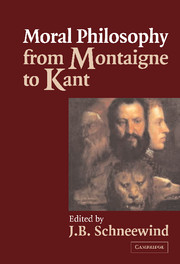Book contents
- Frontmatter
- Contents
- Preface
- Acknowledgments
- Foreword to the One-Volume Reprint
- Introduction
- PROLEGOMENA: SOME QUESTIONS RAISED
- PART I REWORKING NATURAL LAW
- PART II INTELLECT AND MORALITY
- PART III EPICUREANS AND EGOISTS
- PART IV AUTONOMY AND RESPONSIBILITY
- The Earl of Shaftesbury
- Francis Hutcheson
- Joseph Butler
- David Hume
- Christian August Crusius
- Richard Price
- Jean-Jacques Rousseau
- Thomas Reid
- Immanuel Kant
- Supplemental Bibliography
Joseph Butler
Published online by Cambridge University Press: 05 June 2012
- Frontmatter
- Contents
- Preface
- Acknowledgments
- Foreword to the One-Volume Reprint
- Introduction
- PROLEGOMENA: SOME QUESTIONS RAISED
- PART I REWORKING NATURAL LAW
- PART II INTELLECT AND MORALITY
- PART III EPICUREANS AND EGOISTS
- PART IV AUTONOMY AND RESPONSIBILITY
- The Earl of Shaftesbury
- Francis Hutcheson
- Joseph Butler
- David Hume
- Christian August Crusius
- Richard Price
- Jean-Jacques Rousseau
- Thomas Reid
- Immanuel Kant
- Supplemental Bibliography
Summary
Introduction
Joseph Butler, born in 1692 into a family of Dissenters – Protestants who were not members of the Church of England – studied at a Dissenting academy until 1714. During this time he corresponded with Samuel Clarke about the latter's proofs of the existence of God; Clarke admired the letters enough to publish the exchange in later editions of his own work. Butler then went to Oxford to prepare for ordination in the Church of England. He became a priest soon after he graduated in 1718 and was appointed preacher at the Rolls Chapel in London. It was here that he delivered the Fifteen Sermons (1726) on which his importance as a moral philosopher rests. In 1736 he wrote a lengthy attack on deism, the view that a fully adequate religion can be developed by natural reason without the aid of any revelation and that faith in the distinctive doctrines of Christianity is not essential to religion. Butler's work The Analogy of Religion, Natural and Revealed, to the Constitution and the Course of Nature (1736) was used in the education of Church of England clergy through the remainder of the eighteenth century and much of the nineteenth. It was generally thought to have destroyed the deistic position and stopped it from gathering adherents. Butler devoted the rest of his life to his work in the church. He was the bishop first of Bristol and then, late in life, of Durham. He died in 1752.
- Type
- Chapter
- Information
- Moral Philosophy from Montaigne to Kant , pp. 525 - 544Publisher: Cambridge University PressPrint publication year: 2002

